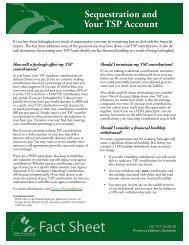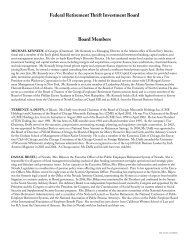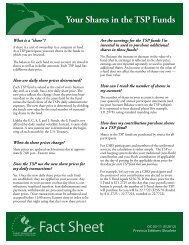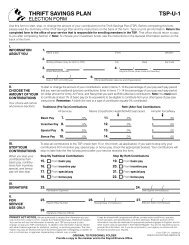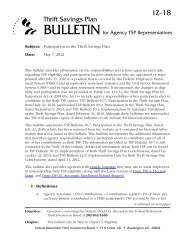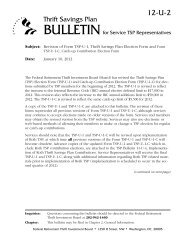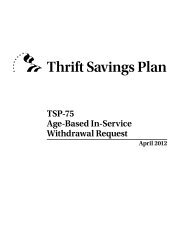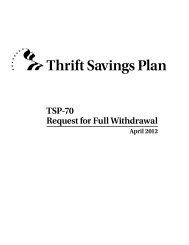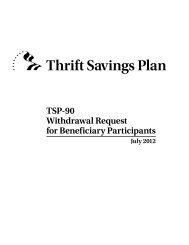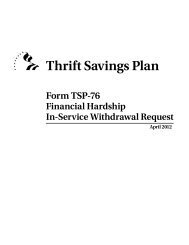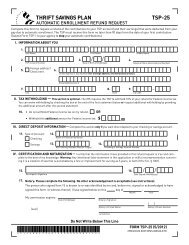Effect of Nonpay Status on Your TSP Account - Thrift Savings Plan
Effect of Nonpay Status on Your TSP Account - Thrift Savings Plan
Effect of Nonpay Status on Your TSP Account - Thrift Savings Plan
Create successful ePaper yourself
Turn your PDF publications into a flip-book with our unique Google optimized e-Paper software.
THRIFT SAVINGS PLAN<br />
YOUR PLAN YOUR FUTURE Fact<br />
Sheet OC<br />
<str<strong>on</strong>g>Effect</str<strong>on</strong>g> <str<strong>on</strong>g>of</str<strong>on</strong>g> <str<strong>on</strong>g>N<strong>on</strong>pay</str<strong>on</strong>g> <str<strong>on</strong>g>Status</str<strong>on</strong>g><br />
<strong>on</strong> <strong>Your</strong> <strong>TSP</strong> <strong>Account</strong><br />
This fact sheet explains the effects a period <str<strong>on</strong>g>of</str<strong>on</strong>g> n<strong>on</strong>pay has <strong>on</strong> <strong>TSP</strong> loans, c<strong>on</strong>tributi<strong>on</strong>s, and withdrawals. It is<br />
for civilian employees who are placed in n<strong>on</strong>pay status (e.g., furlough or leave without pay) and for members<br />
<str<strong>on</strong>g>of</str<strong>on</strong>g> the uniformed services who are in the Ready Reserves and have been given approval by their command to<br />
skip scheduled drills, or whose yearly drill schedule is performed over a <strong>on</strong>e- or two-m<strong>on</strong>th period. 1 It does<br />
not apply to employees who are in n<strong>on</strong>pay status performing an assignment with a state or local government<br />
agency under the provisi<strong>on</strong>s <str<strong>on</strong>g>of</str<strong>on</strong>g> the Intergovernmental Pers<strong>on</strong>nel Act (IPA) or to employees who are in n<strong>on</strong>pay<br />
status serving as full-time <str<strong>on</strong>g>of</str<strong>on</strong>g>ficers or employees <str<strong>on</strong>g>of</str<strong>on</strong>g> a uni<strong>on</strong>. 2<br />
1. Loans<br />
After you have read this secti<strong>on</strong>, see the chart at the end<br />
<str<strong>on</strong>g>of</str<strong>on</strong>g> this fact sheet for a summary <str<strong>on</strong>g>of</str<strong>on</strong>g> the rules that apply<br />
to employees in n<strong>on</strong>pay status who have <strong>TSP</strong> loans.<br />
Can I take a <strong>TSP</strong> loan while I am in<br />
n<strong>on</strong>pay status?<br />
No. When the <strong>TSP</strong> issues you a loan, loan payments<br />
are deducted from your pay. Therefore, if you are not<br />
receiving pay, you will not be eligible for a <strong>TSP</strong> loan.<br />
Can I take a <strong>TSP</strong> loan while I am furloughed?<br />
If the furlough is expected to last 30 days or less — yes.<br />
If the furlough will last more than 30 days — no. If you<br />
expect to be furloughed <strong>on</strong> a periodic basis (for example,<br />
<strong>on</strong>e day per pay period), you can take a <strong>TSP</strong> loan but<br />
will be resp<strong>on</strong>sible for keeping your loan payments upto-date<br />
if you d<strong>on</strong>’t earn enough per pay period for your<br />
agency to make each required loan payment. The secti<strong>on</strong><br />
<str<strong>on</strong>g>of</str<strong>on</strong>g> this fact sheet, “What if I already have a <strong>TSP</strong> loan<br />
when I am placed in n<strong>on</strong>pay status,” discusses how to<br />
keep your account current under these circumstances.<br />
When you sign your <strong>TSP</strong> Loan Agreement, you promise<br />
to repay your loan and authorize the <strong>TSP</strong> to deduct your<br />
loan payments from your pay. The first payment is due<br />
1 Most uniformed services members will never be in n<strong>on</strong>pay status.<br />
2 Under these arrangements, your <strong>TSP</strong> c<strong>on</strong>tributi<strong>on</strong>s will c<strong>on</strong>tinue. If<br />
you have a <strong>TSP</strong> loan, your loan payments must also c<strong>on</strong>tinue. See your<br />
pers<strong>on</strong>nel or benefits <str<strong>on</strong>g>of</str<strong>on</strong>g>fice for informati<strong>on</strong> about your <strong>TSP</strong> account.<br />
<strong>on</strong> or before the 60th day following the loan issue date.<br />
5 Code <str<strong>on</strong>g>of</str<strong>on</strong>g> Federal Regulati<strong>on</strong>s (CFR) § 1655.14(c). If<br />
you reas<strong>on</strong>ably believe your furlough will last 30 days<br />
or less, you can truthfully sign the Loan Agreement because<br />
you reas<strong>on</strong>ably believe that your loan payments<br />
will start within the required period and that you will<br />
be able to repay your loan. However, as discussed below,<br />
should the furlough exceed 30 days, you run the risk <str<strong>on</strong>g>of</str<strong>on</strong>g><br />
being required to pay taxes <strong>on</strong> all or a porti<strong>on</strong> <str<strong>on</strong>g>of</str<strong>on</strong>g> the loan<br />
amount, as well as an additi<strong>on</strong>al 10% tax penalty.<br />
What happens if my furlough exceeds 30 days?<br />
The Internal Revenue Code (IRC) requires that <strong>TSP</strong><br />
loans be repaid in level payments. IRC § 72(p)(2)(C).<br />
Payment through regular payroll deducti<strong>on</strong>s satisfies this<br />
requirement. If your loan is not repaid in level payments,<br />
the IRC requires the <strong>TSP</strong> to declare a taxable distributi<strong>on</strong>.<br />
This means that the <strong>TSP</strong> will report the unpaid<br />
loan balance (including any accrued interest) as income<br />
to you. You must pay tax <strong>on</strong> this amount and, if you are<br />
under age 59½, you may also be subject to an additi<strong>on</strong>al<br />
10% tax penalty. Treas. Reg. § 1.72(p)(1), Q. & A. 11.<br />
Although tax-exempt and Roth c<strong>on</strong>tributi<strong>on</strong>s that may<br />
be included in the distributi<strong>on</strong> are not subject to tax, any<br />
Roth earnings included in the distributi<strong>on</strong> will be subject<br />
to Federal income tax, even if you have already met the<br />
c<strong>on</strong>diti<strong>on</strong>s necessary for your Roth earnings to be qualified.<br />
3 Therefore, you must be very sure that your furlough<br />
3 Roth earnings become qualified (i.e., paid tax-free) when the following<br />
two c<strong>on</strong>diti<strong>on</strong>s have been met: (1) 5 years have passed since January 1 <str<strong>on</strong>g>of</str<strong>on</strong>g><br />
the calendar year in which you made your first Roth c<strong>on</strong>tributi<strong>on</strong> and<br />
(2) you have reached age 59½ or have a permanent disability. Note: The<br />
<strong>TSP</strong> cannot certify to the IRS that you meet the Internal Revenue Code’s<br />
definiti<strong>on</strong> <str<strong>on</strong>g>of</str<strong>on</strong>g> a disability when your taxes are reported. Therefore, you<br />
must provide the justificati<strong>on</strong> to the IRS when you file your taxes.<br />
95-4 (2/2013)<br />
Previous Editi<strong>on</strong>s Obsolete
will last 30 days or less when you sign your Loan Agreement,<br />
or be prepared to make regular loan payments from<br />
your own funds, because you could face severe tax c<strong>on</strong>sequences<br />
if the furlough lasts l<strong>on</strong>ger.<br />
What if I already have a <strong>TSP</strong> loan when I<br />
am placed in n<strong>on</strong>pay status?<br />
Because <strong>TSP</strong> loan payments are made through payroll<br />
deducti<strong>on</strong>s, a period without pay will result in missed<br />
payments (unless you make payments directly from<br />
your own funds). If you go into approved n<strong>on</strong>pay status,<br />
the IRC allows you to suspend <strong>TSP</strong> loan payments<br />
for up to <strong>on</strong>e year <str<strong>on</strong>g>of</str<strong>on</strong>g> the n<strong>on</strong>pay period. A suspensi<strong>on</strong><br />
<str<strong>on</strong>g>of</str<strong>on</strong>g> loan payments is not automatic. To suspend your<br />
payments, you (or your agency or service) must provide<br />
the <strong>TSP</strong> with proper documentati<strong>on</strong> <str<strong>on</strong>g>of</str<strong>on</strong>g> your n<strong>on</strong>pay<br />
status. A special rule applies if you are a civilian entering<br />
n<strong>on</strong>pay status to perform military service. In this<br />
case, you will be permitted to suspend payments <strong>on</strong> your<br />
loan until you return to pay status, even if your civilian<br />
n<strong>on</strong>pay status lasts l<strong>on</strong>ger than <strong>on</strong>e year. (You cannot<br />
repay your civilian <strong>TSP</strong> loan by having loan payments<br />
deducted from your uniformed services pay.)<br />
What if I already have a <strong>TSP</strong> loan and my<br />
furlough requires me to work fewer hours?<br />
Occasi<strong>on</strong>ally an agency must reduce the hours <str<strong>on</strong>g>of</str<strong>on</strong>g> many<br />
<str<strong>on</strong>g>of</str<strong>on</strong>g> its employees due to a lack <str<strong>on</strong>g>of</str<strong>on</strong>g> funds. Instead <str<strong>on</strong>g>of</str<strong>on</strong>g> furloughing<br />
its employees for c<strong>on</strong>tinuous periods, an agency<br />
may furlough its employees for disc<strong>on</strong>tinuous periods<br />
(e.g., <strong>on</strong>e day every week or <strong>on</strong>e day every pay period).<br />
Agencies may choose to use a disc<strong>on</strong>tinuous furlough<br />
because it reduces the financial impact <strong>on</strong> employees and<br />
lessens the disrupti<strong>on</strong> to the agency.<br />
Nevertheless, a disc<strong>on</strong>tinuous furlough may cause an<br />
employee to not have sufficient pay to cover all deducti<strong>on</strong>s.<br />
When this occurs, agencies must follow an order<br />
<str<strong>on</strong>g>of</str<strong>on</strong>g> precedence to determine which deducti<strong>on</strong>s will be<br />
processed. 4 Under this order <str<strong>on</strong>g>of</str<strong>on</strong>g> precedence, deducti<strong>on</strong>s<br />
for retirement, social security, Medicare tax, Federal income<br />
tax, health insurance, and other items are processed<br />
ahead <str<strong>on</strong>g>of</str<strong>on</strong>g> <strong>TSP</strong> loan payments. C<strong>on</strong>sequently, employees<br />
furloughed for disc<strong>on</strong>tinuous periods may not have<br />
enough gross pay for the agency to make a deducti<strong>on</strong> for<br />
<strong>TSP</strong> loan payments and these employees may fall behind<br />
in their <strong>TSP</strong> loan payments. Agencies are not permitted<br />
to submit partial loan payments.<br />
4 See “PPM-2008-01; Order Of Precedence When Gross Pay Is Not Sufficient<br />
To Permit All Deducti<strong>on</strong>s,” at http://www.chcoc.gov/transmittals/<br />
TransmittalDetails.aspx?TransmittalID=1477.<br />
If you do not have enough gross pay for your agency<br />
to make a deducti<strong>on</strong> for your <strong>TSP</strong> loan payments, you<br />
must submit loan payments from your pers<strong>on</strong>al funds<br />
directly to <strong>TSP</strong>. Use Form <strong>TSP</strong>-26, Loan Payment Coup<strong>on</strong>,<br />
which is available <strong>on</strong> the <strong>TSP</strong> website. Follow all<br />
instructi<strong>on</strong>s <strong>on</strong> the coup<strong>on</strong> so that your payment can be<br />
processed properly.<br />
The <strong>TSP</strong> will notify you if you have missed more than<br />
2½ loan payments at the end <str<strong>on</strong>g>of</str<strong>on</strong>g> any calendar quarter.<br />
The notice will provide you with the amount needed to<br />
bring your loan up-to-date (the “cure” amount). If you<br />
do not submit this amount by the required date, the<br />
unpaid balance (including any accrued interest) will be<br />
declared a taxable distributi<strong>on</strong>. This means the <strong>TSP</strong> must<br />
report to the IRS any outstanding loan balance and interest<br />
as income to the you, and you will be required to pay<br />
taxes (and potentially a 10% early withdrawal penalty) <strong>on</strong><br />
the amount.<br />
When do I need to notify the <strong>TSP</strong> that I am<br />
in n<strong>on</strong>pay status?<br />
If your n<strong>on</strong>pay status is less than 30 days, you do not<br />
need to notify the <strong>TSP</strong>; however, you are still resp<strong>on</strong>sible<br />
for ensuring that your loan payments are up-to-date. If<br />
your n<strong>on</strong>pay is expected to last — or has been extended<br />
— for more than 30 days, you or your agency or service<br />
must c<strong>on</strong>tact the <strong>TSP</strong> and provide the documentati<strong>on</strong><br />
listed in the next secti<strong>on</strong>.<br />
How do I notify the <strong>TSP</strong> that I am in n<strong>on</strong>pay<br />
status?<br />
Ask your agency or service to submit <strong>on</strong>e <str<strong>on</strong>g>of</str<strong>on</strong>g> the following<br />
to the <strong>TSP</strong>:<br />
• Form <strong>TSP</strong>-41, Notificati<strong>on</strong> to <strong>TSP</strong> <str<strong>on</strong>g>of</str<strong>on</strong>g> <str<strong>on</strong>g>N<strong>on</strong>pay</str<strong>on</strong>g><br />
<str<strong>on</strong>g>Status</str<strong>on</strong>g>; or<br />
• Form SF-50, Notificati<strong>on</strong> <str<strong>on</strong>g>of</str<strong>on</strong>g> Pers<strong>on</strong>nel Acti<strong>on</strong>; or<br />
• a letter <strong>on</strong> agency or service letterhead, signed by an<br />
appropriate agency <str<strong>on</strong>g>of</str<strong>on</strong>g>ficial (or your commander or<br />
adjutant), and c<strong>on</strong>taining your name, date <str<strong>on</strong>g>of</str<strong>on</strong>g> birth,<br />
and Social Security number; the beginning date <str<strong>on</strong>g>of</str<strong>on</strong>g><br />
the n<strong>on</strong>pay status; the type <str<strong>on</strong>g>of</str<strong>on</strong>g> n<strong>on</strong>pay (military or<br />
general); and the signature and title <str<strong>on</strong>g>of</str<strong>on</strong>g> the agency or<br />
service representative providing the informati<strong>on</strong>.<br />
Or you may submit the following documentati<strong>on</strong> directly<br />
to the <strong>TSP</strong>:<br />
• Form SF-50, Notificati<strong>on</strong> <str<strong>on</strong>g>of</str<strong>on</strong>g> Pers<strong>on</strong>nel Acti<strong>on</strong>; or<br />
• a copy <str<strong>on</strong>g>of</str<strong>on</strong>g> your military orders.<br />
2
When the <strong>TSP</strong> receives valid documentati<strong>on</strong> that has<br />
been properly completed, we will place a n<strong>on</strong>pay hold<br />
<strong>on</strong> your account. You will receive a c<strong>on</strong>firmati<strong>on</strong> notice<br />
when this has been d<strong>on</strong>e. When you receive this notice,<br />
please verify that the beginning date <str<strong>on</strong>g>of</str<strong>on</strong>g> the n<strong>on</strong>pay status<br />
and the type <str<strong>on</strong>g>of</str<strong>on</strong>g> n<strong>on</strong>pay is correct. If it is not, ask your<br />
agency or service to submit corrected informati<strong>on</strong>. If you<br />
do not receive a c<strong>on</strong>firmati<strong>on</strong> notice within two weeks<br />
<str<strong>on</strong>g>of</str<strong>on</strong>g> when the n<strong>on</strong>pay documentati<strong>on</strong> was submitted to<br />
the <strong>TSP</strong>, c<strong>on</strong>tact the <strong>TSP</strong> to verify receipt <str<strong>on</strong>g>of</str<strong>on</strong>g> the properly<br />
completed documentati<strong>on</strong>.<br />
What happens if the <strong>TSP</strong> is not notified that<br />
I am in n<strong>on</strong>pay status?<br />
Until the <strong>TSP</strong> receives the proper n<strong>on</strong>pay documentati<strong>on</strong>,<br />
loan payments will be required. Thus, it is very<br />
important that the <strong>TSP</strong> receives <strong>on</strong>e <str<strong>on</strong>g>of</str<strong>on</strong>g> the documents<br />
listed in the previous secti<strong>on</strong> as so<strong>on</strong> as you go into<br />
n<strong>on</strong>pay status. If neither you nor your agency or service<br />
notifies the <strong>TSP</strong> promptly, your loan could be declared<br />
a taxable distributi<strong>on</strong>.<br />
Once a taxable distributi<strong>on</strong> has been declared, your<br />
loan will be c<strong>on</strong>sidered closed, and you will not be permitted<br />
to repay it. This means the <strong>TSP</strong> must report to the<br />
IRS your outstanding loan balance and interest as income<br />
to you, and you will be required to pay taxes (and potentially<br />
a 10% early withdrawal penalty) <strong>on</strong> the amount.<br />
Also, for 12 m<strong>on</strong>ths following the date <str<strong>on</strong>g>of</str<strong>on</strong>g> the taxable distributi<strong>on</strong>,<br />
you will not be eligible to apply for another loan<br />
from the account. If, during your period <str<strong>on</strong>g>of</str<strong>on</strong>g> n<strong>on</strong>pay status,<br />
you receive miscellaneous civilian basic pay (e.g., for medical,<br />
annual, or military leave, or for a retroactive salary payment)<br />
in an amount large enough to cover a loan payment,<br />
your agency may deduct a loan payment from that pay.<br />
How do I make direct payments <strong>on</strong> my loan<br />
while I am in n<strong>on</strong>pay status?<br />
Because interest will accrue while your payments are suspended,<br />
you may want to make loan payments from your<br />
own funds directly to the <strong>TSP</strong>. You can do so by sending<br />
a pers<strong>on</strong>al check or m<strong>on</strong>ey order to the <strong>TSP</strong>. Be sure to<br />
write your <strong>TSP</strong> account number and loan number <strong>on</strong><br />
your check or m<strong>on</strong>ey order, and send it with a <strong>TSP</strong> Loan<br />
Payment Coup<strong>on</strong> to the <strong>TSP</strong> address <strong>on</strong> the coup<strong>on</strong>. (If<br />
this informati<strong>on</strong> is not provided, the payment will be<br />
returned to you.) The Loan Payment Coup<strong>on</strong> is available<br />
from the <strong>TSP</strong> website (www.tsp.gov), or you can call a<br />
Participant Service Representative. Any payments you<br />
send will be applied first to accrued interest and then to<br />
principal. When your loan is reamortized, the <strong>TSP</strong> will<br />
take into account any loan payments you made during<br />
the n<strong>on</strong>pay period.<br />
What happens to my loan when I return to<br />
pay status within <strong>on</strong>e year?<br />
<strong>Your</strong> <strong>TSP</strong> loan payments must resume when you return<br />
to pay status. If you have not chosen to make loan payments<br />
while in n<strong>on</strong>pay status, your loan will be reamortized<br />
automatically when you, your agency, or your<br />
service submits any <strong>on</strong>e <str<strong>on</strong>g>of</str<strong>on</strong>g> the following documents to<br />
inform the <strong>TSP</strong> that you have returned to pay status:<br />
• Form <strong>TSP</strong>-41; or<br />
• Form SF-50; or<br />
• a letter from your agency or service, as described <strong>on</strong><br />
page 2, and c<strong>on</strong>taining the date your n<strong>on</strong>pay status<br />
ended; or<br />
• Form DD214, Certificate <str<strong>on</strong>g>of</str<strong>on</strong>g> Release or Discharge<br />
from Active Duty (if you were <strong>on</strong> active military<br />
duty).<br />
If you do not receive a c<strong>on</strong>firmati<strong>on</strong> notice that your loan<br />
has been reamortized within two weeks <str<strong>on</strong>g>of</str<strong>on</strong>g> your return to<br />
pay status, please ask your agency or service to submit <strong>on</strong>e<br />
<str<strong>on</strong>g>of</str<strong>on</strong>g> these documents to the <strong>TSP</strong>, or submit the necessary<br />
informati<strong>on</strong> yourself. If your loan payment amount at<br />
the time <str<strong>on</strong>g>of</str<strong>on</strong>g> the reamortizati<strong>on</strong> is sufficient to repay your<br />
loan in full by the maximum time limit allowed by the<br />
IRC and <strong>TSP</strong> regulati<strong>on</strong>s (5 years for a general purpose<br />
loan or 15 years for a residential loan), your loan payment<br />
amount will not be changed, but the term <str<strong>on</strong>g>of</str<strong>on</strong>g> your loan will<br />
be extended (up to the maximum time limit). (See IRC<br />
§ 72(0)(2)(B) and 5 CFR § 1655.5.) However, if your<br />
loan payment amount is not sufficient to repay the loan<br />
in full by the maximum time limit, your loan payment<br />
will be increased. This increase could be quite large if you<br />
did not submit any loan payments during the period <str<strong>on</strong>g>of</str<strong>on</strong>g><br />
n<strong>on</strong>pay status and/or your loan was initially taken for the<br />
maximum term. You will receive a c<strong>on</strong>firmati<strong>on</strong> notice <str<strong>on</strong>g>of</str<strong>on</strong>g><br />
the reamortizati<strong>on</strong>, which will provide you with your new<br />
loan payment amount. If you are a civilian <strong>TSP</strong> participant<br />
and you went into n<strong>on</strong>pay status to perform military<br />
service, the IRC maximum time limit <str<strong>on</strong>g>of</str<strong>on</strong>g> your loan will be<br />
extended by the length <str<strong>on</strong>g>of</str<strong>on</strong>g> your military service. However,<br />
accrued interest may still cause your loan payment amount<br />
to increase. (See IRC § 414(u)(4).)<br />
What happens to my loan if I am in n<strong>on</strong>pay<br />
status for more than <strong>on</strong>e year?<br />
<strong>Your</strong> <strong>TSP</strong> loan payments must resume at the end <str<strong>on</strong>g>of</str<strong>on</strong>g> <strong>on</strong>e<br />
year <str<strong>on</strong>g>of</str<strong>on</strong>g> n<strong>on</strong>pay status, even if you still have not returned<br />
to pay status, unless you are in n<strong>on</strong>pay status to perform<br />
active military duty. <strong>Your</strong> loan will be automatically<br />
reamortized at the end <str<strong>on</strong>g>of</str<strong>on</strong>g> the calendar quarter (March,<br />
3
June, September, or December) following the expirati<strong>on</strong><br />
<str<strong>on</strong>g>of</str<strong>on</strong>g> your <strong>on</strong>e-year limit. Once you have received c<strong>on</strong>firmati<strong>on</strong><br />
<str<strong>on</strong>g>of</str<strong>on</strong>g> your reamortizati<strong>on</strong>, you must make loan payments<br />
directly to the <strong>TSP</strong> from your pers<strong>on</strong>al funds.<br />
Note: The <strong>TSP</strong> will not automatically remove the n<strong>on</strong>pay<br />
hold <strong>on</strong> your account when your loan is reamortized after<br />
you reach the <strong>on</strong>e-year limit. This will happen <strong>on</strong>ly when<br />
you return to pay status and you or your agency or service<br />
submits <strong>on</strong>e <str<strong>on</strong>g>of</str<strong>on</strong>g> the documents listed earlier. If you do not<br />
make the loan payments <strong>on</strong> your reamortized loan, your<br />
loan will be at risk <str<strong>on</strong>g>of</str<strong>on</strong>g> default. At the end <str<strong>on</strong>g>of</str<strong>on</strong>g> each calendar<br />
quarter, the <strong>TSP</strong> will notify you if you missed more than<br />
2½ loan payments or if your loan payments were insufficient.<br />
This notice will provide you with the amount needed<br />
to bring your loan up-to-date (the “cure” amount). If<br />
you do not submit this amount by the required date, the<br />
unpaid balance (including any accrued interest) will be<br />
declared a taxable distributi<strong>on</strong>, as described earlier.<br />
2. C<strong>on</strong>tributi<strong>on</strong>s<br />
Can I c<strong>on</strong>tribute to my <strong>TSP</strong> account while I<br />
am in n<strong>on</strong>pay status?<br />
No. Employee c<strong>on</strong>tributi<strong>on</strong>s to <strong>TSP</strong> accounts must be<br />
made as deducti<strong>on</strong>s from civilian or uniformed services<br />
pay. Therefore, if you are in n<strong>on</strong>pay status for <strong>on</strong>e or<br />
more full pay periods, you cannot c<strong>on</strong>tribute to your <strong>TSP</strong><br />
account during that time. If you are a civilian employee<br />
in n<strong>on</strong>pay status to perform military service, you may<br />
make c<strong>on</strong>tributi<strong>on</strong>s to your uniformed services <strong>TSP</strong> account.<br />
<strong>Your</strong> c<strong>on</strong>tributi<strong>on</strong>s will be deducted from your<br />
uniformed services pay. In additi<strong>on</strong>, when you return to<br />
civilian pay status, you may be entitled to make up <strong>TSP</strong><br />
c<strong>on</strong>tributi<strong>on</strong>s to your civilian account. See the fact sheet<br />
<strong>TSP</strong> Benefits That Apply to Members <str<strong>on</strong>g>of</str<strong>on</strong>g> the Military<br />
Who Return to Federal Civilian Service for more informati<strong>on</strong><br />
about making up <strong>TSP</strong> c<strong>on</strong>tributi<strong>on</strong>s.<br />
What if I am receiving Workers’ Compensati<strong>on</strong>?<br />
Workers’ Compensati<strong>on</strong> benefits are payments made by<br />
the Department <str<strong>on</strong>g>of</str<strong>on</strong>g> Labor’s Office <str<strong>on</strong>g>of</str<strong>on</strong>g> Workers’ Compensati<strong>on</strong><br />
Programs (OWCP) and, by law, are not payments<br />
from which <strong>TSP</strong> c<strong>on</strong>tributi<strong>on</strong>s may be made. C<strong>on</strong>sequently,<br />
while you are in n<strong>on</strong>pay status, you can neither<br />
c<strong>on</strong>tribute to your <strong>TSP</strong> account nor make loan payments<br />
from OWCP benefits.<br />
I am a FERS 5 participant. Will I receive agency<br />
c<strong>on</strong>tributi<strong>on</strong>s while I am in n<strong>on</strong>pay status?<br />
No. Agency Automatic (1%) C<strong>on</strong>tributi<strong>on</strong>s are calculated<br />
based <strong>on</strong> basic pay earned during each pay period.<br />
Agency Matching C<strong>on</strong>tributi<strong>on</strong>s are calculated based<br />
<strong>on</strong> employee c<strong>on</strong>tributi<strong>on</strong>s from that basic pay. C<strong>on</strong>sequently,<br />
if you are not earning basic pay for a particular<br />
pay period, you will not receive either type <str<strong>on</strong>g>of</str<strong>on</strong>g> agency c<strong>on</strong>tributi<strong>on</strong><br />
for that pay period.<br />
I am a FERS participant performing military<br />
service. Will I receive agency c<strong>on</strong>tributi<strong>on</strong>s<br />
for the time I am in n<strong>on</strong>pay status?<br />
If you are a civilian FERS employee in n<strong>on</strong>pay status<br />
to perform military service, you are entitled to receive<br />
restored Agency Automatic (1%) C<strong>on</strong>tributi<strong>on</strong>s when<br />
you return to your civilian job. These c<strong>on</strong>tributi<strong>on</strong>s are<br />
based <strong>on</strong> the basic pay you would have received as a civilian<br />
if you had not been separated or placed in n<strong>on</strong>pay<br />
status to perform military service. You are also entitled to<br />
restored Agency Matching C<strong>on</strong>tributi<strong>on</strong>s for periods <str<strong>on</strong>g>of</str<strong>on</strong>g><br />
military service if you:<br />
• c<strong>on</strong>tributed to your uniformed services <strong>TSP</strong><br />
account from military basic pay, or<br />
• elected to make up employee c<strong>on</strong>tributi<strong>on</strong>s when<br />
you returned from military service.<br />
See the <strong>TSP</strong> fact sheet <strong>TSP</strong> Benefits That Apply to Members<br />
<str<strong>on</strong>g>of</str<strong>on</strong>g> the Military Who Return to Federal Civilian Service<br />
for detailed informati<strong>on</strong> regarding your rights under<br />
the Uniformed Services Employment and Reemployment<br />
Rights Act <str<strong>on</strong>g>of</str<strong>on</strong>g> 1994 (USERRA). For an explanati<strong>on</strong> <str<strong>on</strong>g>of</str<strong>on</strong>g><br />
how USERRA benefits apply to your specific situati<strong>on</strong>,<br />
see your agency Human Resources <str<strong>on</strong>g>of</str<strong>on</strong>g>fice. Only your<br />
agency can determine your eligibility to receive restored<br />
agency c<strong>on</strong>tributi<strong>on</strong>s to your <strong>TSP</strong> account.<br />
Can I make interfund transfers and c<strong>on</strong>tributi<strong>on</strong><br />
allocati<strong>on</strong>s while I am in n<strong>on</strong>pay status?<br />
Yes. An interfund transfer is the movement <str<strong>on</strong>g>of</str<strong>on</strong>g> some or all<br />
<str<strong>on</strong>g>of</str<strong>on</strong>g> your existing account balance am<strong>on</strong>g the <strong>TSP</strong> investment<br />
funds. Therefore, you may make interfund transfers.<br />
A c<strong>on</strong>tributi<strong>on</strong> allocati<strong>on</strong> affects the investment <str<strong>on</strong>g>of</str<strong>on</strong>g><br />
future c<strong>on</strong>tributi<strong>on</strong>s (and loan payments) made to your<br />
account. You may make a c<strong>on</strong>tributi<strong>on</strong> allocati<strong>on</strong> while<br />
in n<strong>on</strong>pay status, but until future c<strong>on</strong>tributi<strong>on</strong>s and loan<br />
5 FERS refers to the Federal Employees’ Retirement System, the<br />
Foreign Service Pensi<strong>on</strong> System, and other equivalent Government<br />
retirement plans.<br />
4
payments are made to your account (or you transfer or<br />
roll over m<strong>on</strong>ey from an IRA or other eligible employer<br />
plan), your c<strong>on</strong>tributi<strong>on</strong> allocati<strong>on</strong> will have no effect.<br />
3. Withdrawals<br />
Can I make an in-service withdrawal while I<br />
am in n<strong>on</strong>pay status?<br />
Yes. While you are in n<strong>on</strong>pay status, you can request an<br />
in-service withdrawal. There are two types <str<strong>on</strong>g>of</str<strong>on</strong>g> in-service<br />
withdrawals: age-based withdrawals for participants who<br />
are age 59 ½ or older, and withdrawals for financial hardship.<br />
If you request a financial hardship withdrawal, you<br />
must be able to certify (under penalty <str<strong>on</strong>g>of</str<strong>on</strong>g> perjury) that<br />
you have a financial hardship and that the amount <str<strong>on</strong>g>of</str<strong>on</strong>g><br />
your request is not greater than the dollar amount <str<strong>on</strong>g>of</str<strong>on</strong>g> your<br />
financial hardship. Funds withdrawn are taxable, and an<br />
early withdrawal penalty tax may apply. For more informati<strong>on</strong>,<br />
read the <strong>TSP</strong> booklet In-Service Withdrawals.<br />
Can I make a post-separati<strong>on</strong> withdrawal<br />
while I am in n<strong>on</strong>pay status?<br />
No. While you are in n<strong>on</strong>pay status, you are still a civilian<br />
employee or a member <str<strong>on</strong>g>of</str<strong>on</strong>g> the uniformed services. You are<br />
not eligible to make a post-separati<strong>on</strong> withdrawal until the<br />
<strong>TSP</strong> is notified by your agency or service that you have<br />
separated from civilian service or the uniformed services.<br />
5
Summary <str<strong>on</strong>g>of</str<strong>on</strong>g> <str<strong>on</strong>g>N<strong>on</strong>pay</str<strong>on</strong>g> <str<strong>on</strong>g>Status</str<strong>on</strong>g> Rules<br />
(Applicable after the <strong>TSP</strong> has been informed <str<strong>on</strong>g>of</str<strong>on</strong>g> your n<strong>on</strong>pay status)<br />
TOPIC<br />
<str<strong>on</strong>g>Effect</str<strong>on</strong>g> <str<strong>on</strong>g>of</str<strong>on</strong>g> Length <str<strong>on</strong>g>of</str<strong>on</strong>g> <str<strong>on</strong>g>N<strong>on</strong>pay</str<strong>on</strong>g><br />
<str<strong>on</strong>g>Status</str<strong>on</strong>g> <strong>on</strong> <strong>TSP</strong> Loans<br />
If you are in n<strong>on</strong>pay status for<br />
reas<strong>on</strong>s other than military service<br />
What you need to know<br />
You are allowed to miss loan payments for<br />
up to <strong>on</strong>e year <str<strong>on</strong>g>of</str<strong>on</strong>g> n<strong>on</strong>pay status.<br />
Accrual <str<strong>on</strong>g>of</str<strong>on</strong>g> Interest Interest c<strong>on</strong>tinues to accrue <strong>on</strong> your loan<br />
during the n<strong>on</strong>pay period.<br />
Making Loan Payments Payments are not required during a n<strong>on</strong>pay<br />
period <str<strong>on</strong>g>of</str<strong>on</strong>g> <strong>on</strong>e year or less. If you want to<br />
make loan payments, use a Loan Payment<br />
Coup<strong>on</strong>*, and send payments directly to<br />
the <strong>TSP</strong>.<br />
Returning to Pay <str<strong>on</strong>g>Status</str<strong>on</strong>g> You or your agency or service must notify<br />
the <strong>TSP</strong> when you return to pay status, and<br />
provide the ending date <str<strong>on</strong>g>of</str<strong>on</strong>g> your n<strong>on</strong>pay<br />
status.<br />
Recalculating <strong>Your</strong> Loan<br />
(i.e., reamortizing your loan)<br />
<str<strong>on</strong>g>Effect</str<strong>on</strong>g> <str<strong>on</strong>g>of</str<strong>on</strong>g> Recalculati<strong>on</strong> <strong>on</strong><br />
<strong>Your</strong> Loan Payments<br />
If your loan is not up-to-date, the <strong>TSP</strong> will<br />
recalculate your loan when you return to<br />
pay status or at the end <str<strong>on</strong>g>of</str<strong>on</strong>g> your <strong>on</strong>e-year<br />
time limit, whichever comes first.<br />
If your current loan payments will not pay<br />
<str<strong>on</strong>g>of</str<strong>on</strong>g>f your loan by the maximum repayment<br />
period, your loan payments will increase,<br />
and you will be notified <str<strong>on</strong>g>of</str<strong>on</strong>g> the new payment<br />
amount.<br />
Resuming Loan Payments If loan payments do not resume through<br />
payroll deducti<strong>on</strong>s after your loan has<br />
been reamortized, you must submit payments<br />
yourself (al<strong>on</strong>g with Loan Payment<br />
Coup<strong>on</strong>s*) to keep your loan from going<br />
into default.<br />
Defaulting <strong>on</strong> a Loan If you miss payments after you return to pay<br />
status, or your loan has been reamortized<br />
due to the <strong>on</strong>e-year limit and you default<br />
<strong>on</strong> your loan, a taxable distributi<strong>on</strong> will be<br />
declared, and you will be subject to tax <strong>on</strong><br />
the taxable porti<strong>on</strong> <str<strong>on</strong>g>of</str<strong>on</strong>g> the outstanding loan<br />
balance (including any accrued interest).<br />
Any Roth earnings included in the distributi<strong>on</strong><br />
will be subject to tax, even if your<br />
earnings were already qualified. If you are<br />
under age 59½, you may also be subject to<br />
an early withdrawal penalty tax.<br />
If you are in n<strong>on</strong>pay status to<br />
perform military service<br />
You are allowed to miss loan payments<br />
throughout the entire time you are in<br />
n<strong>on</strong>pay status.<br />
Interest c<strong>on</strong>tinues to accrue <strong>on</strong> your<br />
loan during the n<strong>on</strong>pay period.<br />
Payments are not required during a<br />
n<strong>on</strong>pay period. If you want to make<br />
loan payments, use a Loan Payment<br />
Coup<strong>on</strong>*, and send payments directly<br />
to the <strong>TSP</strong>.<br />
You or your agency must notify the<br />
<strong>TSP</strong> when you return to pay status, and<br />
provide documentati<strong>on</strong> <str<strong>on</strong>g>of</str<strong>on</strong>g> the ending<br />
date <str<strong>on</strong>g>of</str<strong>on</strong>g> your n<strong>on</strong>pay status.<br />
If your loan is not up-to-date, the <strong>TSP</strong><br />
will recalculate your loan when you<br />
return to pay status. The maximum<br />
time allowed to pay <str<strong>on</strong>g>of</str<strong>on</strong>g>f your loan will<br />
be extended by the length <str<strong>on</strong>g>of</str<strong>on</strong>g> your<br />
military service.<br />
If your current loan payments will<br />
not pay <str<strong>on</strong>g>of</str<strong>on</strong>g>f your loan by the extended<br />
maximum repayment period, your<br />
loan payments will increase, and you<br />
will be notified <str<strong>on</strong>g>of</str<strong>on</strong>g> the new payment<br />
amount.<br />
If loan payments do not resume<br />
through payroll deducti<strong>on</strong>s after your<br />
loan has been reamortized, you must<br />
submit payments yourself (al<strong>on</strong>g with<br />
Loan Payment Coup<strong>on</strong>s*) to keep your<br />
loan from going into default.<br />
If you miss payments after you return<br />
to pay status and you default <strong>on</strong> your<br />
loan, a taxable distributi<strong>on</strong> will be<br />
declared, and you will be subject<br />
to tax <strong>on</strong> the taxable porti<strong>on</strong> <str<strong>on</strong>g>of</str<strong>on</strong>g> the<br />
outstanding loan balance (including<br />
any accrued interest). Any Roth earnings<br />
included in the distributi<strong>on</strong> will<br />
be subject to tax, even if your earnings<br />
were already qualified. If you are under<br />
age 59½, you may also be subject<br />
to an early withdrawal penalty tax.<br />
* The Loan Payment Coup<strong>on</strong> (Form <strong>TSP</strong>-26) is available under Forms & Publicati<strong>on</strong>s <strong>on</strong> the <strong>TSP</strong> website at www.tsp.gov.



